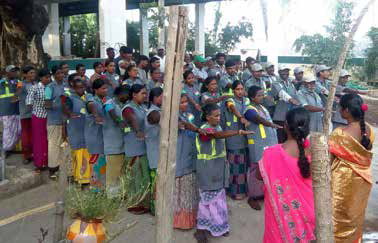
Description of the project: The Kundrathur Solid Waste Management (SWM) project serves a town of 25,000 inhabitants with quality waste sorting and recycling, providing 64 underprivileged women and men with new employment as Green Friends. Women have been included in a male dominated sector via self-help groups that build their technical, environmental and social capacities. Green Friends conduct door-to-door waste collection, recovery by composting, recycling and reuse, diverting most of the town’s garbage from landfills. The project, supported by 340 volunteers, improved the quality of air, water and soil by preventing methane release and waste burning. It also contributed to a major behavioural change regarding littering and waste management.
Climate impact: In serving the 8,500 households of Kundrathur, this SWM initiative has diverted 65-70% of the collected waste stream from reaching the landfill or being burned. 4,540 t. of biodegradable waste has been turned into compost and 2181 t. of other waste has been recycled. A clear climate contribution and improvement from the open dump yards that were causing heavy pollution and release of methane gas. The Green Friends are also involved in a tree planting program.
Gender impact: HHIDS decided in 2013 to form women’s self-help groups in order to equally include female workers in this male-dominated industry. A dedicated coordinator specifically reached out to underprivileged women, who are now equally employed, assigned tasks, and paid. The current 32 women Green Friends enjoy full-time jobs with steady incomes, participate in decision making processes, have enrolled their children in school and receive regular health screenings for their families.
Scalability / replicability: This successful model has been replicated in three nearby towns of Kanchipuram, Tamil Nadu. Financial sustainability is achieved through the collection of user fees for the rendered SWM services and the sales of compost and recycled products. The project achieves positive behavioural changes towards source segregation and sparks initiatives addressing environmental and climate issues.